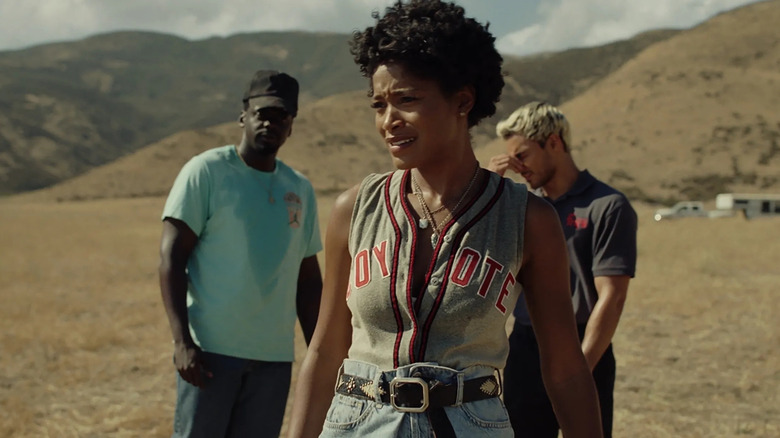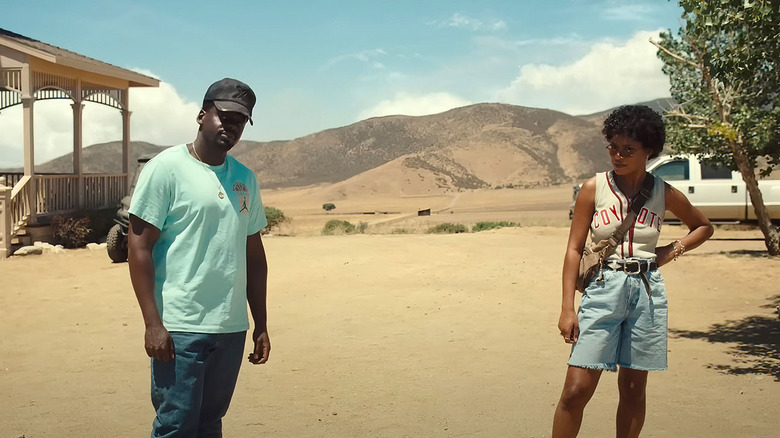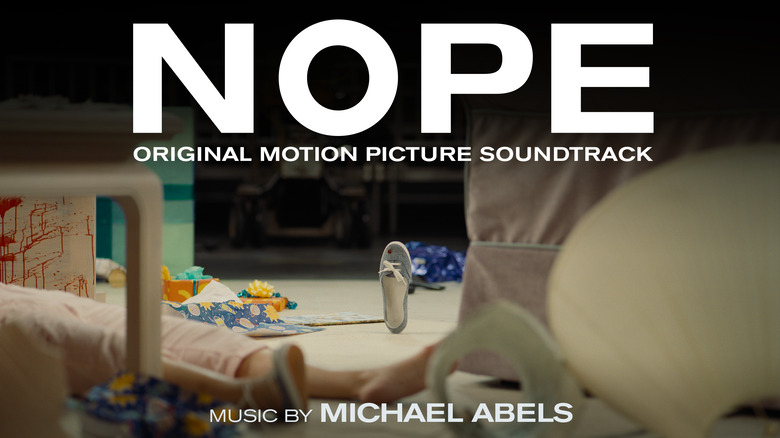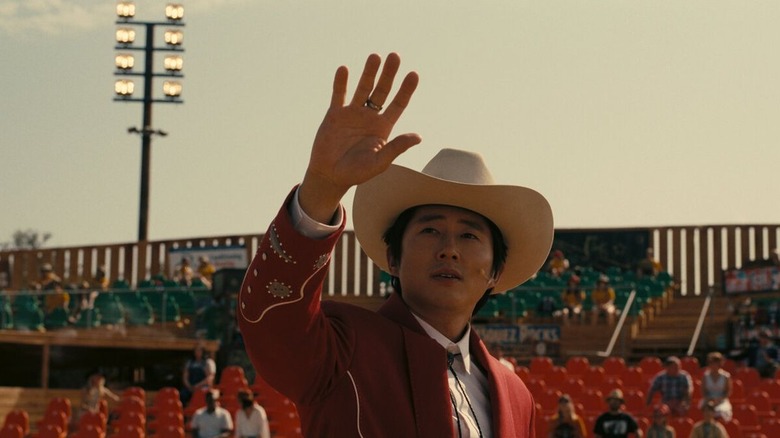Nope Composer Michael Abels Wasn't Exactly Scoring A Sci-Fi Film [Interview]
Michael Abels had a feast of a film to score with "Nope." Filmmaker Jordan Peele's genre-bender lets Abel play with different emotions and styles. The acclaimed summer movie can't be put in a box, and neither can Abels' score, even if it calls to mind great westerns and classic popcorn movies. "Nope" is referential, but unlike many nostalgia pictures today, it has its own vision. Abels and Peele take pieces from the past and run with them organically, not nostalgically.
For years, the duo has been striking fear into audiences. They first collaborated on "Get Out," then sent chills down audiences' spines with "Us," and now, they deliver their most expansive work to date in "Nope." Recently, Abels talked to us about his approach to the film's many genres, how to be referential yet original, and about a "thank you" he owes Steven Spielberg.
It's a sci-fi film except that I don't think of it as a sci-fi film
You really wanted to fill the locations with more sound, obviously a sense of adventure. How did you want to go bigger with the score this time?
Well, the first most practical way is that it's a larger orchestra than I've ever used before. You can hear that. That shows up in the sound. It's worth spending that money and writing in that size. Also, we spent a lot of time making sure the score could ... allow the sound design to come through.
There's a lot of space. There's a lot of silence in the score because [in] that vast wide open valley, it's important to hear the sound that OJ's hearing when he first understands that there may be something out there. Besides the really large orchestra, especially at the end when it really becomes an adventure, before that, there's a lot of space where you're allowed to hear the world that he's in. I think that creates the vastness of the film as well.
Pop and R & B is very important to Jordan Peele's movies. In this case, does any of the soundtrack influence how you follow or lead up to using them?
I know some of them. Part of the journey of music supervision is to try different songs in the film and see what's landing. With each one of those, there's a business negotiation that happens behind the scenes. I'm very much out of all that and not sad about it. Some songs work from day one. I think the Exuma song, which really has a vibe to it, I think that had been in from day one, at least that's my memory.
Then other songs evolve as the film evolves. Sometimes there are scenes that have a song that then the whole scene goes away, and then that's out. I'm always listening to what the new songs are and I'm influenced by what I hear Jordan's choices are going to be. He has great taste in the choices he makes I must say.
He also has such a strong pace and rhythm for suspense. How'd you want to help create that sense of dread he was going for in "Nope?"
Well, we talk a lot about how much foreshadowing we're doing, not only in the film as a whole, but also in each individual scene. He spends a lot of time building that in a scene. He tries it with music as part of a way to build the terror, but also he's unafraid to do it completely dry. Or, to have me write a lot of music, but then scale back to just the most minimal elements of the music.
You see that in the sequence where the Park kids come and they prank Haywood because of Emerald heading off with their fake horse. The kids come to get back at them. That scene, there were versions in which there was a lot of music, but ultimately, once Jordan got the pacing of it just right, he really scaled back the music.
The first time I saw it with an audience was earlier this week and noticing how people jumped during that and how uneasy the audience was, I could tell that he got it just right. It's fun and exciting for me, even when some of the music gets omitted, to see him finally work on where the perfect scare is in each section ... of the film that's terrifying.
Obviously, this is a sci-fi film, while the previous collaborations were horror. Musically, how does the rhythm of suspense between those two genres compare?
Well, yes, it's a sci-fi film except that I don't think of it as a sci-fi film. I don't know if Jordan thinks of it as a sci-fi film. It's absolutely got elements of that, and yes, it is. The way to score it is to think ... what is the character's experience of this? Then you compare that to what a traditional sci-fi film is, let's say. What this film is really about is, it's about the spectacle or what they think is in the sky and what that means. It's a movie about how you would react in the 21st century if that happened. The characters know that it's dangerous and they shouldn't go there, but they're fascinated and they can't help it.
That's the way in which it's a Western. Jordan notices, I think, all of these similarities in these different genres and because he notices them in ways the rest of us wouldn't, he's able to write a story that somehow points that out and makes all these things relevant. He doesn't say, "Okay, I'm making a sci-fi film." He's saying, "I'm making a film where we see how all these things fit together. My job is to make sure I tell the story from each of those perspectives."
In the score, you have some adventure, there [are] some cues at the end that are out and out action-adventure music. But [there are] also the cues that are about horror and terror and suspense. There's ... cues that are really about the relationship between OJ and Emerald, who are brother and sister, and they're very different people, but they're bonding over this shared desire to show the world what it is they're seeing. Rather than saying, "Okay, now I'm writing a sci-fi score," I'm like, "Oh, I have all these different parts of this story that need to be told. How do I write cues that make us feel what the characters are feeling in those moments, and yet have it all come together as one"?
Music is an art that exists only in time
What did you want to express with the cues for the brother and sister relationship?
Warmth, genuine love underneath with some bickering. The warmth and their shared history of growing up on the ranch with their dad and feeling like they want to honor his legacy even in their own different ways. Just real and genuine. You hear it in the cues called, "Preparing the Trap" ... that's a montage, which would normally [be used for scenes where] you're like preparing for battle and strapping on the gear. What they're doing is they're placing monopoly pieces, a thimble, and a shoe, and using a mechanical camera [Laughs]. It's very much the low-tech battle prep and the team coming together and feeling each other's support.
The music is not emo, aggressive music. It's got a rhythmic vibe, but it's chill. Then you hear that same theme again at a "Hero Falls” where it looks like OJ is sacrificing his life in front of this giant thing. And yet, the music begins in a very warm introspective place before it gets big and grand.
Like you said, it's about, what if this happens in the 21st century? Is our sense of awe gone? Would we just commercialize this incredible sight?
Yeah, absolutely.
How did those themes influence your score?
That's mostly what he talks about. I mean, not only because that's in his mind, but I think it's also important for those of us who are on his team to understand what he's going for. He talked about it being a bad miracle from the very beginning. Just from the script. Understanding that this is the overarching theme, when you're reading about all these characters, this Juke Park and Jupiter's Claim and those things, you might not get what the important theme was if you didn't have Jordan there to explain it to you.
I actually, even though he explains it to me, I also had my own process of learning as I watched the film, because I look at what I notice in the film. I'm always trying to come from the characters. When I write music that's scary, I'm usually genuinely terrified by what's on the screen. I look at the expression on the actor's faces and when I see terror, I'm certainly experiencing it. I'm coming from being in the moment. When you're in the moment, it's great to know what the overall storyline or the overall theme is supposed to be, so that you have both the micro and the macro going on as you're writing.
Did your interpretation of the movie keep changing as you scored the film?
Yeah, no, your perspective can shift. I mean, one thing Jordan likes to do as part of his process of exploring and deciding about the score is he'll take a cue and he'll move it. Sometimes he moves it a few seconds to the left or right. You'd be surprised at how the music then highlights different things just from a little bit of a shift. Sometimes he'll move it to an entirely different scene and he'll take a cue and just then temp with it in another scene where I hadn't even either gotten to that scene or even thought about that music working at a different scene.
I end up learning about the score as well, and about how Jordan sees the characters through him, through his experiments. Then I'll be inspired by something I see as a result of him playing with it, and then I'll go, and sometimes the cue ends up going in that scene or I then go and revise it and put the music in a place that I wouldn't have originally thought of. It's part of that. It's a really cool process.
With the end result, how was it hearing the score finally mixed in a theater?
I got to see it in IMAX with an incredible sound system. Of course, I'm going to love the mix. The guys, John Rodd, who mixes my scores, for Jordan and [sound designer] Johnnie Burn, who did the sound, I mean, they're masters. That part is just going to be a thrill for me. I really do notice the audience reaction because I think both comedy and terror are largely to do with [the] timing of an event. Music is an art that exists only in time. That's the canvas of music, if you think about it.
After having spent all this time talking about, and theorizing about timing, to see if all of our thoughts and assumptions and beliefs about that, to see it pay off when an audience reacts, that's why we do it. It's to entertain people and give them an experience and something to talk about. You know whether you've done that by the audience's reaction. That part's a joy.
I have yet to be able to thank Mr. Spielberg in person
By the way, it sadly feels so rare to have a summer movie like this you want to talk about so much.
It is pretty rare. I was so excited to see people's reaction. I still am, when it really opens this weekend, then we'll know. What I did notice after screenings was that people were really interested in talking about it and saying, "What did you think of this? What did that mean?" I think that's a great thing that Jordan's films provide consistently. I'm excited that nobody is doing the same thing.
It's not a passive summer movie experience at all.
I think the people who don't like this movie are really going to not like it. It's not going to be passive. It's going to be aggressive.
But you're still going to have something to think about or talk about.
Precisely. The fact that you have a strong reaction shows that the movie is communicating and that's why we do it.
Were there any Western scores you were thinking about, especially in Jupiter's Claim?
One of the many things I love about working for Jordan is that he is just a vast vault of cultural references. Not only just culturally, not just actors, but also directors and costume design and production design, and music. All those things he somehow keeps in his mind and knows what's on point or what would be not the right version of the reference. When he decides to sacrifice something, I'm thrilled because I feel like I know how to write in a lot of different styles and Jordan's interest in different styles gives me that opportunity to flex that muscle.
When he says, "It's a Western knockoff theme park," I'm like, "I got that. I know exactly what it needs." A lot of the score, as a result, plays as source music in this film, meaning that it plays as if it's just the music that you would hear if you were there. When you first get to Jupiter's Claim, you hear all this Western music that sounds like it's from a theme park. Well, that's original. I wrote that, but it's played out of speakers like it's coming out of the theme park. Only at the very end of the film does one of those, the one with the whistling and the guy's shouting, "Hey," that one comes to life at the very end. It comes out of the speakers and then through the magic of sound, you realize, "Oh, that's the score".
It's so fun to write music like that. When Jupe is trying to do his star lasso experience and getting ready to do what he hopes will be an amazing theme park event, even that music, the cheesy exciting Hollywoody music, that's a cue from the score. That's part of what I do for Jordan. It's got to be legit. All of Jordan's satire is as legit as if it actually really happened. You would really believe that Jupe Park was on a sitcom in the nineties called Gordy's Home, right? It's so believable in the way he does it. I just love participating in helping make the sonic part of that be as real as the visuals.
Did you ever write a theme for Gordy's Home?
Well, I was going to do a theme for "Gordy's Home" and I was going to do that as legit as any nineties sitcom theme. It ended up there wasn't a title sequence for Gordy's Home. There wasn't an opportunity to really do a full Gordy's Home score part. Didn't end up being a thing. I'm down for any satire Jordan chooses to take on. That's a great part of my job.
Steven Spielberg is a fan of the work you do. He told Jordan to keep working with you. For "Nope," did you and Jordan ever talk about John Williams and how they built suspense in "Jaws"?
First of all, how is that for an endorsement, right?
The top endorsement.
Absolutely. The top endorsement. I have yet to be able to thank Mr. Spielberg in person, but you can be sure I'm going to, and I hope to have that chance. Anyway, he sometimes talks about references. He talks about every reference when it's relevant. He often talks about a reference that I wouldn't have even noticed, but Jordan is really a student of cinema. There's no reference that I think that could go past him.
For him, it's always in the context of not wanting it to be a thing that people think they've already seen. If Jordan thinks he's already seen it, he does not want to do it. That's how he'll explain to me about music that I do. He expects it to reference things. Sometimes when it's satire, I'm able to make it spot on because for Jordan it's satire, in the case of the Western music. But in the case of music, that's not satire, he wants it to reference things, but only in a way that works in a Jordan Peele world. I'm asked to both gently touch on something, but then not have it be that. I think for every artist, that's a really great place to be, to be both encouraged to acknowledge the past and then take it to the next step.
"Nope" is now playing in theaters.



